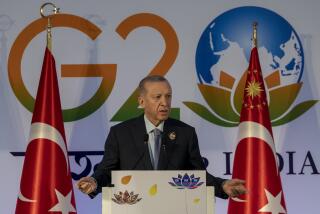Turkey Mulls Letting U.S. Use Its Bases
- Share via
ANKARA, Turkey — ANKARA, Turkey -- The new prime minister here said Monday that his government and the armed forces “very much wish to avoid a war” in Iraq but are weighing a request by the Bush administration to deploy thousands of U.S. troops in Turkey to create a northern front against Saddam Hussein.
“We strongly value relations with our American friends,” Prime Minister Abdullah Gul said in an interview after returning from a five-country Middle East diplomatic mission that had been interpreted as an affirmation of Turkey’s antiwar stance. “We wish to deepen our strategic alliance with the United States. That is our government’s policy.”
Gul declined to indicate whether Turkey would support a U.S.-led war against Iraq, but he emphasized that the military and civilian leaderships are working together to come to a decision. He denied reports in the Turkish and foreign media that Turkey’s military commanders are eager for an American deployment but are being held back by his government, which took office after Nov. 3 elections.
“It is unimaginable that our government ... would clash with the military over so vital an issue,” said Gul, who met Monday with armed forces chief Gen. Hilmi Ozkok.
Turkey’s military leaders have sounded just as skeptical as their civilian counterparts that the overthrow of the Iraqi president would bring any political or economic benefit to their nation, which is a member of the North Atlantic Treaty Organization.
“A war against Iraq would not be in Turkey’s interests,” Ozkok said last week. “I’ve not heard anyone in Turkey say, ‘Let’s go to war in Iraq.’ ”
The Bush administration has been increasing pressure on Turkey, a key ally and NATO’s sole Muslim member, to open its ports and bases for use in a possible war against Iraq. The U.S. also has asked Turkey to allow the deployment of tens of thousands of American troops who would transit Turkish territory into Kurdish-controlled northern Iraq, where they would open a front against Hussein’s forces.
On Monday, 150 U.S. military inspectors arrived in Turkey to begin examining 10 air bases and two ports for possible use by American forces. Turkish officials approved the inspection several months ago but then dragged their feet on the final arrangements.
Turkey played a pivotal role in the 1991 Persian Gulf War by opening its bases to U.S. and British planes to stage bombing raids against Iraqi targets.
But now, more than a month after U.S. Deputy Defense Secretary Paul D. Wolfowitz met with Turkish leaders here to seek approval for the new deployment of American troops, Turkey has yet to answer. U.S. officials have been quoted as saying that from the standpoint of military planning, time is running out for Turkey to make up its mind.
Gul did not confirm that his government would allow the use of Turkish facilities, but a source close to the prime minister said that “if push comes to shove, we will allow use of our bases” to fly troops into and out of the country.
Deployment of U.S. ground troops through Turkey into Iraq would be harder to sell to the public. A poll indicated that 88% of Turks are against a war.
Turkish law requires parliamentary approval for the deployment of foreign troops in the country, but officials say they have no plans to go to parliament with such a request before U.N. chief weapons inspector Hans Blix reports to the Security Council on Jan. 27 on the progress of arms monitors in Iraq.
A senior Turkish official who spoke on condition of anonymity said Turkey would no longer insist on a second U.N. resolution that would authorize military action against Iraq before joining forces with the U.S.
Turkey’s main concern is the possible economic and political fallout of a war.
“We suffered greatly in the previous war, especially from an economic standpoint. We do not wish to endure the same hardship again,” Gul said.
Turkey says it has lost as much as $100 billion in trade revenue as a result of U.N. sanctions imposed on Iraq after its 1990 invasion of Kuwait. The U.S. reportedly has offered up to $14 billion in loans and grants.
The Turkish military is concerned that the Kurds of northern Iraq would exploit the turmoil of a war to set up an independent state, which would serve as a magnet for Turkey’s own restive Kurds.
“We still very much wish to avoid a war,” Gul said. “But the situation is extremely serious, and Iraq has to fully comply with the weapons inspectors and prove it is not a threat to regional peace.”
On Sunday, Turkey’s trade minister, Kursat Tuzmen, met with Hussein in Baghdad and handed over a letter from Gul urging the Iraqi leader to cooperate with U.N. inspectors.
*
Times staff writer Paul Richter in Washington contributed to this report.
More to Read
Sign up for Essential California
The most important California stories and recommendations in your inbox every morning.
You may occasionally receive promotional content from the Los Angeles Times.










